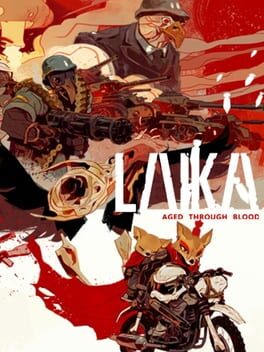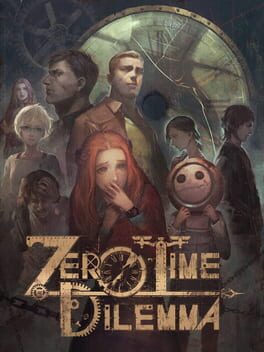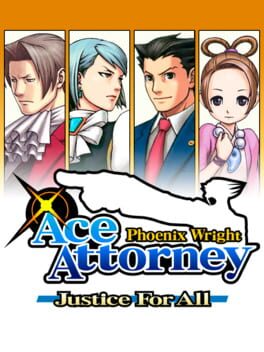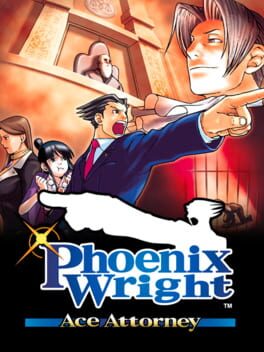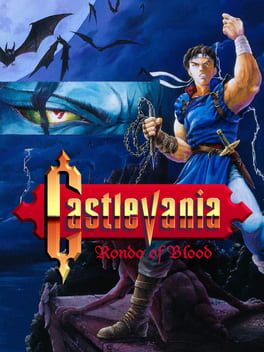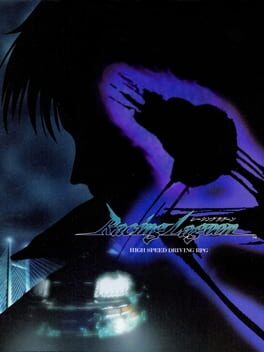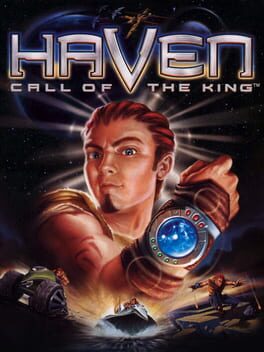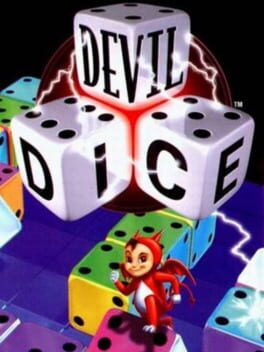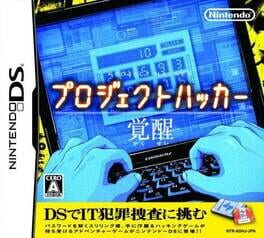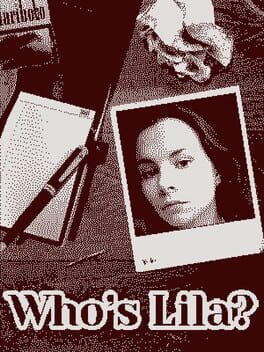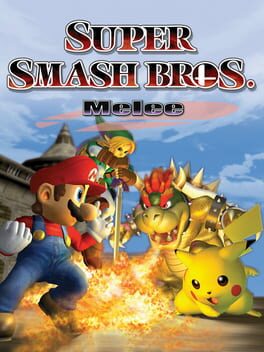alagoa
BACKER
117 Reviews liked by alagoa
Probably the Uchikoshi's strongest and boldest work after ever17 and 999. It is fairly maligned for really being another completely different thing in a series which is barely a series. Did a whole fucking podcast on this franchise which culminated in "actually this game rocks".
This review contains spoilers
Phoenix Wright Ace Attorney Justice for all is a pretty interesting title to talk about, the “black sheep” of the trilogy as it were, the game at large has a really interesting general consensus, where most folks would agree that while the majority of the game isn’t good, the final case is one of the series’ absolute finest, and makes the whole thing worth going through just to get to that point. I feel that that viewpoint does a lot of JFA a bit of a disservice, though admittedly I do have some somewhat spicy takes about this one. There’s some general gameplay improvements here like being able to present character profiles as evidence and having a more flexible health system, but the main new addition here is the Psyche Locks, which I’m a tad conflicted on, while they do make investigation segments more interesting, their actual in-universe presence is pretty contrived and annoyingly glanced upon, like Phoenix is basically given a magical lie detector, but not only does it not work in court for reasons literally never touched on, but Wright doesn’t just have the bright idea to go up to everyone and ask whether they’re the culprit or not, know I know that sounds silly, but the game literally establishes in case 4 that Phoenix is ALLOWED to use it that way, it just never happens for the sake of the story, which kinda bothers me a lot, but overall it’s whatever, I can suspend my suspension of disbelief.
As for some more hot takes, I actually really like the soundtrack here and prefer it to that of the first game’s even, the OST isn’t quite as catchy and doesn’t have as many “banger” tracks per-se, but it makes up for it with some truly gut-wrenching emotional and dramatic pieces, from Announce the Truth to core to the credits theme and to ALL the Reminiscence themes-GOD these Reminiscence fucking HIT. The first game had some good emotional pisces, but the stuff in JFA just genuinely gets to my heart, and I can’t get enough of it.
On to the cases though! The Lost Turnabout kinda faces a dilemma where it needs to explain the game’s mechanics in case the player hasn’t picked up the first game yet, but that wouldn’t make much sense in-universe seeing as Wright already knows how to lawyer, so the solution is was using a somewhat generic amnesia plot line giving the characters an excuse to go over everything again. Yeah it’s kinda annoying, but it doesn’t really bother me too much. I know some people who HATE this case, like consider it the literal worst in the series even, but honestly I don’t really get that, like yeah it’s really simple and the tutorial stuff is annoying, but the characters are mostly pretty fun, and there’s some fun contradictions, really I think it’s mostly just inoffensive, and being a tutorial case I don’t think there’s really much reason to get too up in arms about it.
Reunion and Turnabout is an interesting one, cause honestly I’m not even sure what the general consensus on it even is, like It’s considered the second best case in the game by most, but at the same time people still push the narrative that everything pre case 4 is pretty bad, and when it comes to this case, I honestly don’t really see it. It relies a lot on the supernatural aspects of the series which I don’t enjoy much, but it subverts your expectations and ends up being a really clever murder plan using no channeling whatsoever. It seems hopeless at first, but is really satisfying to nail down. It introduces us to series staple characters like Pearl Fey and Franziska Von Karma, both of which I personally find to be really enjoyable, and the culprit here is a definite highlight, Ini Miney isn’t the series’ first “tragic villain”, that title goes to Yanni Yogi, but I think she’s the first one I ended up actually feeling really bad for, she has a really unique tragic backstory, and it does a similar thing to turnabout Samurai where it’s not completely clear whether the victim Turner Grey actually drugged her or not, you get why she’d want to kill him, but like it’s still fucked up and tragic. Honestly I think my biggest issue here is that I don’t like Maya needing to be the defendant again, this on top of her being kidnapped in case 4 is really frustrating, she’s a fun character and has great synergy with wright, but she spends most of the game being a damsel in distress which is just really disappointing, making the only full case in the game where she gets to really shine is…
Turnabout Big Top, from the very early days of the Ace Attorney fandom, this case was the very commonly agreed upon “worst case in the series”, and through all the changes in opinion this freaking fandom has gone through over the years, this title has impressively remained pretty intact, people REALLY don’t like this one, and alright… I’d like to make clear that I do get why people hate this one. The subplot with a bunch of the characters wanting to marry a 16 year old is bad and creepy, some of the characters can be kinda annoying, and there are some pretty ridiculous leaps in logic. All of that is true, yes, but here’s my take on it, this is one of the most subversive cases in the original trilogy in a lot of ways, and I think the general circus setting makes the tragedy here really fascinating. Firstly the defendant Max Galactica is barely even likable, which is kind of a series first, the dude is a total self loving jerk, with the quote on quote “nice humble guy” here being, of all people, the culprit. The entire circus gang here is really interesting to see in this time of crisis, the headmaster loved by everyone has passed away, but most of the crew seems not all too bothered, and I feel the game uses this to display the way many try and cope with grief, from Moe trying to just laugh it off and hide his depression, to Regina dismissing the notion entirely. By the end the circus crew is forced to accept everything that’s happened, including that one of their own is responsible, and Phoenix’s take down of him is raw and unfiltered, a depressing reality check for everyone involved. It was an extremely bold choice to make the culprit literally disabled, and while Acro’s want to murder a kid, but here’s the thing, Acro is a disabled man literally doomed to the circus for the rest of his life, him existence being made into an endless comedy being stuck only knowing these annoying over the top clowns, I honestly think it’s reasonable that he’s somewhat go insane, regardless of how good he hides it. The tragedy here isn’t quite as compelling as the one from case 2, but dammit this shit is still really heartbreaking, at the end the circus crew is forced to face the brutal reality of everything that’s happened, but come to know that they have each other, and can move forward to a brighter tomorrow.
But finally, we’ve got the big one, Farewell, my Turnabout. In all honesty, I don’t really have much to say about this case that hasn’t already been repeated by many others over the years, but needless to say, yeah this shit’s amazing. I feel like most people coming into this series had a feeling that they were gonna play the “guilty defendant” card at SOME point, and DAMN did they play this card well. Matt Engarde is such a great villain, he’s a complete contrast to the culprits of cases 2 and 3, just being this insanely evil celebrity hiding his facade behind the mask of an oblivious airhead. The whole dynamic between him, Juan Corrida, and Adrian Andrews is so compelling and provides a fascinating critique of celebrity culture, with them being prived upon for pretty much their whole lives, leading to Matt and Juan slowly becoming hyper-obsessed rivals getting to the point of driving their former loved ones to suicide, all just for the ability to get back at one another, to be more beloved and more popular, it’s an exaggerated display of the most disgusting areas of celebrity culture that’s fascinating to see broken down here. One of my favorite details the game never really touches upon is that the woman driven to suicide by Matt and Juan’s rivalry, Celeste Inpax, was long assumed to have left a suicide note due to remains of ink on her corpses’ finger, but near the cases end it’s revealed that there never end was a suicide note, meaning that after Juan found her hanged body, he literally dipped her fingers in ink so that the public would assume that a note was left, all JUST so that he could get back at Engrade, absolutely depraved… Andrews then is the one left with bearing the consequences of the two’s maddening hate, and her character is arguably one of the most complex in the series, she’s heavily implied to be somewhat mentally ill with needing to always be heavily dependent on someone, along with being a survivor of a failed suicide, she’s not entierly “inocent” what with being the one to further frame the crime on Engarde, but still goddamn throughout this case her worst fears and anxieties are constantly being brought to the forefront, and it is truly saddening to see. Cases like these serve as an example for the main conceit of Justice for All, why the legal system NEEDS prosecutors. For most of the first games, prosecutors were portrayed pretty heavily as the “bad guys” with Edgeworth kinda being the face of them for Wright. And while Wright was the one to teach Edgeworth his wrongs back then, in JFA, after coming back from his self discovery and finding his reason to live, Edgeworth comes back, and manages to show wright the true meaning of the courts, it’s not just about needing to trust in a client, or get a client found guilty, it’s about both sides coming together to find the truth. Without a prosecutor, there would be nothing stopping Wright from just accusing Andrews and leaving it at that, but Edgeworth, despite giving Andrews some choice words and quite a hard time, was ultimately there to defend her, only when the shields and the swords are crossed, is when the light can be made bare to see. It is through Franziska Von Karma’s warped views that Edgeworth is able to confront his past, while Franziska is obsessed with victory and being perfect, Edgeworth has come to realize that you shouldn’t be perfect, that’s not what makes you a good prosecutor, a good human. It’s all about coming together, and using everyone’s opposed viewpoints and perspectives, that is the only way for the courts to prosper… And GOD there’s so much other great stuff I haven’t even gotten to yet, like how great Gumshoe is here as an ally to Wright, or how cool Shelly the killer is as a terrifying presence, with the final choice with him being so powerful, possibly leading to that absolutely GUT WRENCHING bad ending that never fails to hit me in the feels, but I feel like I’ve said most of what I needed to, Farewell, My Turnabout is just as good, if not even BETTER than most make it out to be, and even if the rest of JFA really WAS garbage, it STILL would’ve made going through the whole thing 100% worth it.
I know that I’ve kinda neglected to go over and dwell on a lot of JFA’s shortcomings, but honestly, I just really love this game at the end of the day, and I feel that despite everything, it makes for a fantastic followup that helped fully define with the series is, with deeper, more complex plots and characters that I still find myself thinking about to this day. Honestly, the fact that this game was somehow fully written by 1 person over the course of only FOUR MONTHS is insane, even if you hate JFA, you can’t deny that for the amount of time given, this script absolutely hit it out of the park, a true testament to the sheer power of love, dedication, and a WHOLE lot of alcohol.
As for some more hot takes, I actually really like the soundtrack here and prefer it to that of the first game’s even, the OST isn’t quite as catchy and doesn’t have as many “banger” tracks per-se, but it makes up for it with some truly gut-wrenching emotional and dramatic pieces, from Announce the Truth to core to the credits theme and to ALL the Reminiscence themes-GOD these Reminiscence fucking HIT. The first game had some good emotional pisces, but the stuff in JFA just genuinely gets to my heart, and I can’t get enough of it.
On to the cases though! The Lost Turnabout kinda faces a dilemma where it needs to explain the game’s mechanics in case the player hasn’t picked up the first game yet, but that wouldn’t make much sense in-universe seeing as Wright already knows how to lawyer, so the solution is was using a somewhat generic amnesia plot line giving the characters an excuse to go over everything again. Yeah it’s kinda annoying, but it doesn’t really bother me too much. I know some people who HATE this case, like consider it the literal worst in the series even, but honestly I don’t really get that, like yeah it’s really simple and the tutorial stuff is annoying, but the characters are mostly pretty fun, and there’s some fun contradictions, really I think it’s mostly just inoffensive, and being a tutorial case I don’t think there’s really much reason to get too up in arms about it.
Reunion and Turnabout is an interesting one, cause honestly I’m not even sure what the general consensus on it even is, like It’s considered the second best case in the game by most, but at the same time people still push the narrative that everything pre case 4 is pretty bad, and when it comes to this case, I honestly don’t really see it. It relies a lot on the supernatural aspects of the series which I don’t enjoy much, but it subverts your expectations and ends up being a really clever murder plan using no channeling whatsoever. It seems hopeless at first, but is really satisfying to nail down. It introduces us to series staple characters like Pearl Fey and Franziska Von Karma, both of which I personally find to be really enjoyable, and the culprit here is a definite highlight, Ini Miney isn’t the series’ first “tragic villain”, that title goes to Yanni Yogi, but I think she’s the first one I ended up actually feeling really bad for, she has a really unique tragic backstory, and it does a similar thing to turnabout Samurai where it’s not completely clear whether the victim Turner Grey actually drugged her or not, you get why she’d want to kill him, but like it’s still fucked up and tragic. Honestly I think my biggest issue here is that I don’t like Maya needing to be the defendant again, this on top of her being kidnapped in case 4 is really frustrating, she’s a fun character and has great synergy with wright, but she spends most of the game being a damsel in distress which is just really disappointing, making the only full case in the game where she gets to really shine is…
Turnabout Big Top, from the very early days of the Ace Attorney fandom, this case was the very commonly agreed upon “worst case in the series”, and through all the changes in opinion this freaking fandom has gone through over the years, this title has impressively remained pretty intact, people REALLY don’t like this one, and alright… I’d like to make clear that I do get why people hate this one. The subplot with a bunch of the characters wanting to marry a 16 year old is bad and creepy, some of the characters can be kinda annoying, and there are some pretty ridiculous leaps in logic. All of that is true, yes, but here’s my take on it, this is one of the most subversive cases in the original trilogy in a lot of ways, and I think the general circus setting makes the tragedy here really fascinating. Firstly the defendant Max Galactica is barely even likable, which is kind of a series first, the dude is a total self loving jerk, with the quote on quote “nice humble guy” here being, of all people, the culprit. The entire circus gang here is really interesting to see in this time of crisis, the headmaster loved by everyone has passed away, but most of the crew seems not all too bothered, and I feel the game uses this to display the way many try and cope with grief, from Moe trying to just laugh it off and hide his depression, to Regina dismissing the notion entirely. By the end the circus crew is forced to accept everything that’s happened, including that one of their own is responsible, and Phoenix’s take down of him is raw and unfiltered, a depressing reality check for everyone involved. It was an extremely bold choice to make the culprit literally disabled, and while Acro’s want to murder a kid, but here’s the thing, Acro is a disabled man literally doomed to the circus for the rest of his life, him existence being made into an endless comedy being stuck only knowing these annoying over the top clowns, I honestly think it’s reasonable that he’s somewhat go insane, regardless of how good he hides it. The tragedy here isn’t quite as compelling as the one from case 2, but dammit this shit is still really heartbreaking, at the end the circus crew is forced to face the brutal reality of everything that’s happened, but come to know that they have each other, and can move forward to a brighter tomorrow.
But finally, we’ve got the big one, Farewell, my Turnabout. In all honesty, I don’t really have much to say about this case that hasn’t already been repeated by many others over the years, but needless to say, yeah this shit’s amazing. I feel like most people coming into this series had a feeling that they were gonna play the “guilty defendant” card at SOME point, and DAMN did they play this card well. Matt Engarde is such a great villain, he’s a complete contrast to the culprits of cases 2 and 3, just being this insanely evil celebrity hiding his facade behind the mask of an oblivious airhead. The whole dynamic between him, Juan Corrida, and Adrian Andrews is so compelling and provides a fascinating critique of celebrity culture, with them being prived upon for pretty much their whole lives, leading to Matt and Juan slowly becoming hyper-obsessed rivals getting to the point of driving their former loved ones to suicide, all just for the ability to get back at one another, to be more beloved and more popular, it’s an exaggerated display of the most disgusting areas of celebrity culture that’s fascinating to see broken down here. One of my favorite details the game never really touches upon is that the woman driven to suicide by Matt and Juan’s rivalry, Celeste Inpax, was long assumed to have left a suicide note due to remains of ink on her corpses’ finger, but near the cases end it’s revealed that there never end was a suicide note, meaning that after Juan found her hanged body, he literally dipped her fingers in ink so that the public would assume that a note was left, all JUST so that he could get back at Engrade, absolutely depraved… Andrews then is the one left with bearing the consequences of the two’s maddening hate, and her character is arguably one of the most complex in the series, she’s heavily implied to be somewhat mentally ill with needing to always be heavily dependent on someone, along with being a survivor of a failed suicide, she’s not entierly “inocent” what with being the one to further frame the crime on Engarde, but still goddamn throughout this case her worst fears and anxieties are constantly being brought to the forefront, and it is truly saddening to see. Cases like these serve as an example for the main conceit of Justice for All, why the legal system NEEDS prosecutors. For most of the first games, prosecutors were portrayed pretty heavily as the “bad guys” with Edgeworth kinda being the face of them for Wright. And while Wright was the one to teach Edgeworth his wrongs back then, in JFA, after coming back from his self discovery and finding his reason to live, Edgeworth comes back, and manages to show wright the true meaning of the courts, it’s not just about needing to trust in a client, or get a client found guilty, it’s about both sides coming together to find the truth. Without a prosecutor, there would be nothing stopping Wright from just accusing Andrews and leaving it at that, but Edgeworth, despite giving Andrews some choice words and quite a hard time, was ultimately there to defend her, only when the shields and the swords are crossed, is when the light can be made bare to see. It is through Franziska Von Karma’s warped views that Edgeworth is able to confront his past, while Franziska is obsessed with victory and being perfect, Edgeworth has come to realize that you shouldn’t be perfect, that’s not what makes you a good prosecutor, a good human. It’s all about coming together, and using everyone’s opposed viewpoints and perspectives, that is the only way for the courts to prosper… And GOD there’s so much other great stuff I haven’t even gotten to yet, like how great Gumshoe is here as an ally to Wright, or how cool Shelly the killer is as a terrifying presence, with the final choice with him being so powerful, possibly leading to that absolutely GUT WRENCHING bad ending that never fails to hit me in the feels, but I feel like I’ve said most of what I needed to, Farewell, My Turnabout is just as good, if not even BETTER than most make it out to be, and even if the rest of JFA really WAS garbage, it STILL would’ve made going through the whole thing 100% worth it.
I know that I’ve kinda neglected to go over and dwell on a lot of JFA’s shortcomings, but honestly, I just really love this game at the end of the day, and I feel that despite everything, it makes for a fantastic followup that helped fully define with the series is, with deeper, more complex plots and characters that I still find myself thinking about to this day. Honestly, the fact that this game was somehow fully written by 1 person over the course of only FOUR MONTHS is insane, even if you hate JFA, you can’t deny that for the amount of time given, this script absolutely hit it out of the park, a true testament to the sheer power of love, dedication, and a WHOLE lot of alcohol.
Balatro
2024
This review contains spoilers
The first Ace Attorney title is really as iconic as it gets for me, right off the bat from the first case, the formula is just captivating, there's not much in gaming like the feeling of finding a contradiction in Ace Attorney, and this title has a lot of really clever ones. It’s supported by some great spritework and a banger soundtrack, though I do think compared to most of the series’ later titles, the OST here is a tad overrated, it’s still nevertheless really great
The First Turnabout's story is really not much to write home about storywise, but IMO it does a fantastic job at introducing you to the game’s world, the character relationships, and its rules.
Turnabout Sisters continues on this trajectory, expanding with new characters and mechanics. I do feel like the case itself though is the game’s weakest one though, it’s not “bad” but some moments like the finale feel a tad rashed, though I do enjoy just how pathetic Red White ends up being on the stand, and that he’s taken down via blackmailing him, seeing as how he basically built his whole empire off of blackmail. Of course Mia comes back here via Maya channeling her, and in general I’m not really a fan of supernatural elements like spirit channeling in this series, I tend to prefer Ace Attorney when its rules are more grounded in reality.
Turnabout Samurai is a really underrated one I feel, it lets us see a lot more sides of Wright, Maya, Edgeworth, and Gumshoe, while also having a really cool setting with Global studios, and a surprisingly dark bittersweet conclusion, I like how it’s kept kinda vague whether Jack Hammer actually killed his co-star Manuel, it’s never outright stated, but we do know that he would have it in him seeing as he planned on killing, Vasquez, who is also a really unique villain for this series. The fact that the crime was done in self defense means that, realistically, she could’ve gone out of it with not much reciprocation, but seeing as she had dark ties and secrets, it makes sense she’d rather not get her hands dirty, even if by trying to pin the crime on Powers, she ended up burying her own grave landing her presumably a far worse sentence. Powers is also a pretty standout defendant I feel, this is the first case in the game where it doesn’t spoil who the culprit is in the intro, so I feel a lot of first time players might’ve actually suspected Powers guilty, but throughout the case you slowly form a bit of a bond with the guy and realize he’s kinda just a really nice chill dude, which really highlights the idea of the trust between defense attorney and defendant. Really if it wasn’t for the annoying side characters and long-winded investigation segments, I think this could’ve gone out as an all time classic, albeit a simple one.
Turnabout Goodbyes then IS very much an all time classic though, it starts off with a great fake out depicting the events of the crime in a way that makes it seem as if Edgeworth was the culprit, seeing as the game revealed its killers ahead of time in the first 2 cases, it’s fair to assume most thought at this moments that Edgeworth WOULD be the final culprit, but it’s then subverted when you learn that he’s actually the defendant, allowing him and wright to bond more as the game delves into their past. Edgeworth is easily my favorite character in the series, and one of my favorites ever actually, and he gets a ton of great development here, and the game portrayed his clear emotional turmoil very well, also love how Gumshoe goes from being really rude towards wright at the beginning, to them working together a lot here, their bond is really nice and Gumshoe is also just inherently very likable. I really enjoy a lot of the smaller flourishes here like the mystery of Gourdy that gets thrown into the mix, I know some people don’t really like that weird side stuff, but idk I think needing to solve smaller riddles on the road to eventually solve the whole case is really satisfying, and it also lead to a lot of funny moments. Ace Attorney’s sense of humor has always been one I really enjoyed, and the jokes here like Gumshoe’s secret weapons and cross examining the parrot are great. Edgeworth’s story ties in with the culprit’s tragic past really well, and the game having an asshole defense attorney as the victim here does a good job with making it clear that both sides of the law can be corrupt. The series definitely throw all its eggs in one basket with Von Karma here, having wright take down this legendary prosecutor who never lost a case THIS early on in the series feels kinda odd, even if to be fair Phoenix got INSANELY lucky here. Von Karma being tied to the crime feels a tad contrived, but I don’t really mind seeing as he’s a really fun villain, the main thing that kinda bothers me though is that Von Karma didn’t really have a clear motive to set this whole thing up, feel like that should've been fleshed out a bit more, but other then that this is a really fun one
Finally there’s Rise From the Ashes, which feels a bit weird to talk about alongside the rest of the game seeing as it was a later inclusion. This case is pretty notorious for its slow pacing, and yeah the beginning segments can kinda drag, but honestly as someone who’s been able to bear with some REAL long Visual Novels, it never bothered me all too much, seeing as what it sets up later pays off with some REAL fantastic stuff, Damon Gant is iconic for a reason, he’s not particularly deep in any way, but as a villain he’s really intimidating, and fun to eventually take down. I know a lot of people don’t really fuck with the DS gimmick segments, but idk I still kinda find them novel, and the security tape during the second trial leads to a lot of really fun contradictions. The case adds a lot of fun new characters (and also Meekins), the new music is some of the best in the game, the story is really interesting and well thought out. Really if you overlook the pacing, I do think there’s a ton to love here.
At the end of the day, yeah Ace Attorney 1’s a really fun time! It doesn’t reach the complex and/or emotional highs of most of its sequels and spin-offs, but it still does a fantastic job at introducing new players into this fantastic universe.
The First Turnabout's story is really not much to write home about storywise, but IMO it does a fantastic job at introducing you to the game’s world, the character relationships, and its rules.
Turnabout Sisters continues on this trajectory, expanding with new characters and mechanics. I do feel like the case itself though is the game’s weakest one though, it’s not “bad” but some moments like the finale feel a tad rashed, though I do enjoy just how pathetic Red White ends up being on the stand, and that he’s taken down via blackmailing him, seeing as how he basically built his whole empire off of blackmail. Of course Mia comes back here via Maya channeling her, and in general I’m not really a fan of supernatural elements like spirit channeling in this series, I tend to prefer Ace Attorney when its rules are more grounded in reality.
Turnabout Samurai is a really underrated one I feel, it lets us see a lot more sides of Wright, Maya, Edgeworth, and Gumshoe, while also having a really cool setting with Global studios, and a surprisingly dark bittersweet conclusion, I like how it’s kept kinda vague whether Jack Hammer actually killed his co-star Manuel, it’s never outright stated, but we do know that he would have it in him seeing as he planned on killing, Vasquez, who is also a really unique villain for this series. The fact that the crime was done in self defense means that, realistically, she could’ve gone out of it with not much reciprocation, but seeing as she had dark ties and secrets, it makes sense she’d rather not get her hands dirty, even if by trying to pin the crime on Powers, she ended up burying her own grave landing her presumably a far worse sentence. Powers is also a pretty standout defendant I feel, this is the first case in the game where it doesn’t spoil who the culprit is in the intro, so I feel a lot of first time players might’ve actually suspected Powers guilty, but throughout the case you slowly form a bit of a bond with the guy and realize he’s kinda just a really nice chill dude, which really highlights the idea of the trust between defense attorney and defendant. Really if it wasn’t for the annoying side characters and long-winded investigation segments, I think this could’ve gone out as an all time classic, albeit a simple one.
Turnabout Goodbyes then IS very much an all time classic though, it starts off with a great fake out depicting the events of the crime in a way that makes it seem as if Edgeworth was the culprit, seeing as the game revealed its killers ahead of time in the first 2 cases, it’s fair to assume most thought at this moments that Edgeworth WOULD be the final culprit, but it’s then subverted when you learn that he’s actually the defendant, allowing him and wright to bond more as the game delves into their past. Edgeworth is easily my favorite character in the series, and one of my favorites ever actually, and he gets a ton of great development here, and the game portrayed his clear emotional turmoil very well, also love how Gumshoe goes from being really rude towards wright at the beginning, to them working together a lot here, their bond is really nice and Gumshoe is also just inherently very likable. I really enjoy a lot of the smaller flourishes here like the mystery of Gourdy that gets thrown into the mix, I know some people don’t really like that weird side stuff, but idk I think needing to solve smaller riddles on the road to eventually solve the whole case is really satisfying, and it also lead to a lot of funny moments. Ace Attorney’s sense of humor has always been one I really enjoyed, and the jokes here like Gumshoe’s secret weapons and cross examining the parrot are great. Edgeworth’s story ties in with the culprit’s tragic past really well, and the game having an asshole defense attorney as the victim here does a good job with making it clear that both sides of the law can be corrupt. The series definitely throw all its eggs in one basket with Von Karma here, having wright take down this legendary prosecutor who never lost a case THIS early on in the series feels kinda odd, even if to be fair Phoenix got INSANELY lucky here. Von Karma being tied to the crime feels a tad contrived, but I don’t really mind seeing as he’s a really fun villain, the main thing that kinda bothers me though is that Von Karma didn’t really have a clear motive to set this whole thing up, feel like that should've been fleshed out a bit more, but other then that this is a really fun one
Finally there’s Rise From the Ashes, which feels a bit weird to talk about alongside the rest of the game seeing as it was a later inclusion. This case is pretty notorious for its slow pacing, and yeah the beginning segments can kinda drag, but honestly as someone who’s been able to bear with some REAL long Visual Novels, it never bothered me all too much, seeing as what it sets up later pays off with some REAL fantastic stuff, Damon Gant is iconic for a reason, he’s not particularly deep in any way, but as a villain he’s really intimidating, and fun to eventually take down. I know a lot of people don’t really fuck with the DS gimmick segments, but idk I still kinda find them novel, and the security tape during the second trial leads to a lot of really fun contradictions. The case adds a lot of fun new characters (and also Meekins), the new music is some of the best in the game, the story is really interesting and well thought out. Really if you overlook the pacing, I do think there’s a ton to love here.
At the end of the day, yeah Ace Attorney 1’s a really fun time! It doesn’t reach the complex and/or emotional highs of most of its sequels and spin-offs, but it still does a fantastic job at introducing new players into this fantastic universe.
Simplesmente sensacional.
Castlevania em sua forma mais pura, justa, divertida e incrível.
O jogo que precede Symphony definitivamente não decepciona em absolutamente nada, com músicas incríveis, visuais lindos, personagens carismáticos e uma dificuldade balanceada. O mais próximo de perfeito que um Classicvania poderia chegar.
Castlevania em sua forma mais pura, justa, divertida e incrível.
O jogo que precede Symphony definitivamente não decepciona em absolutamente nada, com músicas incríveis, visuais lindos, personagens carismáticos e uma dificuldade balanceada. O mais próximo de perfeito que um Classicvania poderia chegar.
Racing Lagoon
1999
Devil Dice
1998
Harmful Park
1997
An exceptional horizontal cute-em-up, exclusively for PSX.
I was waffling between 3.5 and 4, as the scoring in this game is both super compelling on its surface and--at times--very annoying to actually execute. It revolves, primarily, around damaging large enemies just enough to almost kill them, and then bombing when a ton of smaller enemies are onscreen to finish them off and cash in on a huge multiplier (which increases for every enemy killed with a single "projectile").
Figuring out just how much damage to do to these larger enemies takes some trial and error, and you'll often overshoot it and frustratingly miss out on a jackpot. Luckily, there are plenty of opportunities, and you get an extra life every 500,000 points, which is extremely generous; so, after some practice, the system becomes a bit more lenient, because with more score comes more bombs, and more bombs equals more attempts at massive cash-outs. (On my clearing run I scored around 6 million points, which is 12 lives on top of those I started with!)
In addition to the addictive gameplay--in which you cycle between four different shots that have four unique bomb types--the sprites, backgrounds, and music in this game are Konami-esque in quality. Beautiful animations, a huge and gorgeous palette of bright colors, massive bosses, silly gags--it's all just as delightful as it tries to be.
There's an English patch out there, and the game actually does have a story, ridiculous though it may be; so check that out if you don't speak Japanese and want to give this a shot.
I was waffling between 3.5 and 4, as the scoring in this game is both super compelling on its surface and--at times--very annoying to actually execute. It revolves, primarily, around damaging large enemies just enough to almost kill them, and then bombing when a ton of smaller enemies are onscreen to finish them off and cash in on a huge multiplier (which increases for every enemy killed with a single "projectile").
Figuring out just how much damage to do to these larger enemies takes some trial and error, and you'll often overshoot it and frustratingly miss out on a jackpot. Luckily, there are plenty of opportunities, and you get an extra life every 500,000 points, which is extremely generous; so, after some practice, the system becomes a bit more lenient, because with more score comes more bombs, and more bombs equals more attempts at massive cash-outs. (On my clearing run I scored around 6 million points, which is 12 lives on top of those I started with!)
In addition to the addictive gameplay--in which you cycle between four different shots that have four unique bomb types--the sprites, backgrounds, and music in this game are Konami-esque in quality. Beautiful animations, a huge and gorgeous palette of bright colors, massive bosses, silly gags--it's all just as delightful as it tries to be.
There's an English patch out there, and the game actually does have a story, ridiculous though it may be; so check that out if you don't speak Japanese and want to give this a shot.
Yakuza 0
2015
To live is to not run away
The original Yakuza, the game that transitioned Sega out of the in-house console era onto the PS2, opens with this line. It embodies the spirit of the entire franchise that would come to be. Yakuza’s spirit was that of the romanticized Bushido code mixed with the rich atmosphere and contemporary setting of Yakuza crime movies. What distinguished Kiryu from the real-life yakuza was his way of life: his tenacity and insistence on walking the path laid out for him.
Yakuza 0, as a tenth anniversary celebration, looks to explore that tenacity, that insistence on looking past the inflating yen of the late 80s, and direct Kiryu and another man with a common conviction—Goro Majima—toward their personal truths.
> Through this whole ordeal, I saw a lot of people try to set things right. It blew me away, man. Not just yakuza. Civilians too. It really drove home just how green I still am.
The streets of Kamurocho in ‘88 were dirty and grimy. There’s a bed of trash coating the sidewalk, and gaudy lights and excess are laid out everywhere. It’s the kind of environment that breeds monsters willing to tear each other apart, tooth and nail, for a spot of land about the size of a doghouse. Perfect space for a 20-year-old Kiryu, aimlessly following the whims of others and vaguely following his adoptive father’s footsteps.
Kiryu’s philosophy and way of life is slowly being brought to the surface. Every surprise attack he gets from Kuze, every slimy wishy-washy opinion from Awano, and every piece of shit thing a yakuza takes the liberty of doing to those he cares about pushes him over the edge. There’s a level of reverence 0’s Kiryu plot has towards the character’s legacy as a whole – filling in some of the missing pieces of characterization that understandably couldn’t be explored in the original ‘05 game.
Kuze specifically is masterfully crafted as a benchmark for how Kiryu is doing, and his level of resolve. He’s a stubborn old man that tries to constantly beat Kiryu down through raw strength reminiscent of his boxer days. He’s the crown jewel of Kiryu’s antagonists in his simplicity and brutality. Tachibana was able to confide in a young Kiryu, but it took his death for a switch to flip in the kid’s head – he’s going to stop the lieutenants with his own two fists even if it costs him his life. Walking away, the old man’s able to acknowledge Kiryu as fit for the job.
Shibusawa isn’t nearly as competently written as Kuze, but his ability to challenge Kiryu’s beliefs and sense of direction by highlighting the futility of honorable yakuza and Shintaro Kazama’s disregard for the idea forces Kiryu to make a personal change – he’s no longer his oyabun’s puppet but wants nothing more than to carve out his own fate.
As he gets his last drink in at Serena, Kiryu throws on a gray suit: it’s not a pure white, but black isn’t particularly fitting either. It’s grounded by a passionate, burning red collared shirt underneath.
> Watchin’ you, I figured out just how important hangin’ on really is.
Soutenbori is similarly drowning in excess, but a level of sophistication comes from the sprawling cabaret scene and laid-back food-focused economy of Osaka. The indulgence of the settings hides the truth: it’s a jail for a Majima in his mid-20s, treated like a toy, and referred to as “Shimano’s project."
Yakuza 4 sets the groundwork for Majima as more than comic relief but establishes him as a broken man using the facade of the Mad Dog to get through to the next day. There’s a certain level of reverence both Majima and the story itself share in regards to the alleged “slayer of 18," Taiga Saejima.
Majima’s arc has a lot of highlights, one of the most prominent being the parallels drawn between a young, recently traumatized Goro and a young girl limited by her psychosomatically triggered blindness. Makoto grounds Majima’s story and forces him to punch above his weight and be shaped into more than just a hitman. The implication in Yakuza 4’s cutscene where he and Saejima prepare to gun down the Ueno Seiwa clan is that this isn’t their first time doing something like this. Saejima himself has done some dirty shit and no way his sworn brother hasn’t tagged along.
Unfortunately, Makoto is frustratingly passive throughout most of the story. She is entirely aware of this, but this self-awareness doesn’t really sway me over to loving her character. It doesn’t help that her big statement of independence is where she foolishly puts her life at risk in front of a cabal of hardened yakuza.
Sagawa is excellent and stands as a checkpoint for Majima to look at as he grows and experiences the storyline. He’s always right around the corner, taunting Majima and being a stick up the guy’s ass. It’s unfortunate that no one else really has the staying power he does consistently throughout the narrative. Lao Gui feels like a last-minute addition that is hamfistedly Majima’s final boss.
Goro Majima’s story is one that pushes the guy into his own twisted way of life – even if he pushes everyone away from him and destroys his ability to be engaged with seriously. As a mad dog, nobody can throw him into a bullshit scheme. No one can trick and deceive him, nobody can pull out weird underhanded tactics, and no one can ever toss him into an alley and gouge out his eye.
Majima is not Kiryu. I wish this could have been further reinforced throughout Zero. This might be a bit of a hot take, but I genuinely wished Majima had taken out Lao Gui with his own two hands. Sera bullshits him with weird excuses like “Makoto wouldn’t want to carry that weight”, knowing full well the girl still resents the Dojima Family deeply and openly expresses a desire for their destruction. Majima’s big poignant moment could have been giving Lao Gui a quick gash to the head with a knife, refusing to take orders from anyone he doesn’t feel like. Majima didn’t have a Nishiki-type figure to stop him at the moment – Saejima is in jail. I was really hungry for the more unstable, vicious Majima we see in Yakuza 1, and the lack of these moments in the main story make it hard to believe the guy organically transitioned into that older iteration.
While Zero continues this exploration beautifully, its characterization of Majima doesn’t quite strike the balance of moral grayness in his earlier iterations with the more archetypal heroism of past RGG protagonists—he's forced to be a Kiryu-type in substories, side content, and at points in the main story.
The grind of the bubble
Zero is in love with the legacy of the franchise, and as a last-ditch effort to encourage newcomers, it pushes the player into engaging with its side attractions. As this isn’t my first time experiencing the game, it really got on my nerves.
Majima’s Cabaret Club Czar starts off as a fun minigame that espouses traditional Yakuza protagonist beliefs of fair play and fair treatment of women. It takes the awful cabaret hostess minigame from Yakuza 3 and 4 and flips it on its head, making it an enjoyable bite-sized experience you can knock out in 3-minute intervals.
The different women you interact with are really likable and fun to be around. Their presence is made clear through the cabaret “practice” dialogue you go through with them, and the outings like pool, disco, and karaoke feel very emblematic of the era. I think my favorite hostess was Ai.
It follows a very predictable pattern that side content tends to follow in these games in the same vein as Yakuza 5’s racing. You’ve got five big bads that each answer to an even bigger bad, and after beating the shit out of each of them, they join your side. While you can see the progression from a mile, you’d have to be a real cynical person to not get even a grin out of the interactions.
The problem is, like most of 0’s side content, you’re pushed into doing an entire session of the mechanic starting the game out, and if you want to meaningfully level up your skill tree and remove its blockages, you really have to thoroughly and consistently engage with it. CCC is grindy, and if you’re not doing it on the side, you’ll have to just dedicate days of your life to catching up if you want to really level up the game’s styles.
You end it with the Mad Dog awakening, which is less a thematic parallel and more a gesture of fan service.
Looking at Kiryu’s Real Estate Royale, things are a lot worse. While CCC was a minigame that demanded your active attention, Real Estate Royale is entirely passive and expects you to dedicate real life time to it. The subplot with your two coworkers and the Five Kings is a less engaging version of Majima’s. Real estate is far more inflexible to different players’ preferences on how they engage with side content. The expectation is that the user would be tending to real estate on the side between the plots, but not only does this fundamentally break the airtight pacing of the main story, but it’s far too common for players to be too engaged to care for the extraneous bits of a completely disconnected narrative. There’s also an irony in the core mechanic being real estate and accumulating absolute mountains of money that eclipse anything the main story is fighting over.
RER also expects you to accumulate a lot of money through purchases of various properties in the seedy Kamurocho underbelly. If you haven’t figured out the common fan strategy of cheesing Mr. Shakedown and getting multipliers off your collection of money, you’ll have to manage by grinding the real estate mechanic itself, gambling on janken half-naked wrestling games, and hopefully running into a couple Nouveau Riche enemies.
At the end, you’re greeted with the legendary Dragon of Dojima style, but about one-third of its usual speed thanks to Yakuza 0’s heat meter system.
That brings me to combat.
Zero’s combat in some ways tries to clean up the extravagant and incredibly long heat moves and over the top nature of Yakuza 5, the last mainline game with the traditional fist-to-fist brawler combat. The multiple style approach from the samurai spin offs Kenzan and Ishin was implemented here and in theory it’s a great idea. You have different approaches to handling combat scenarios and different flavors of enemy. However, the experience is held back entirely by an asinine decision – tying the heat meter’s increases to an increase in speed. This means if you have an empty heat meter, you’re incredibly slow. This happens quite a bit entering fights after having drained your heat on a previous encounter or boss fight, and it makes it increasingly more difficult to even land a hit in.
The point of Heat is to reward the player for staying on top of combat fundamentals by granting them the ability to pull off high-damage spectacle. It was nailed as early as the first game, but somehow they managed to take a step back in Zero? Like I mentioned above, Dragon of Dojima becomes a completely unviable style in this game simply because of how it’s clearly not designed to be played at .75x speed. The style you busted your ass for isn’t really worth using at any point in the game.
A true love letter
Despite it all, Yakuza 0 is an incredibly competent love letter towards the Yakuza franchise as a whole. Its consistent tone, airtight pacing, and avoidance of over-the-top twists characteristic of this franchise helped push Yakuza into the modestly successful franchise it's currently become in the West. Without this game, me and a lot of other people wouldn’t even know it existed. Zero raised the bar for maturity in the series’ storytelling and the games that would follow took the lessons from Zero to great success.
The original Yakuza, the game that transitioned Sega out of the in-house console era onto the PS2, opens with this line. It embodies the spirit of the entire franchise that would come to be. Yakuza’s spirit was that of the romanticized Bushido code mixed with the rich atmosphere and contemporary setting of Yakuza crime movies. What distinguished Kiryu from the real-life yakuza was his way of life: his tenacity and insistence on walking the path laid out for him.
Yakuza 0, as a tenth anniversary celebration, looks to explore that tenacity, that insistence on looking past the inflating yen of the late 80s, and direct Kiryu and another man with a common conviction—Goro Majima—toward their personal truths.
> Through this whole ordeal, I saw a lot of people try to set things right. It blew me away, man. Not just yakuza. Civilians too. It really drove home just how green I still am.
The streets of Kamurocho in ‘88 were dirty and grimy. There’s a bed of trash coating the sidewalk, and gaudy lights and excess are laid out everywhere. It’s the kind of environment that breeds monsters willing to tear each other apart, tooth and nail, for a spot of land about the size of a doghouse. Perfect space for a 20-year-old Kiryu, aimlessly following the whims of others and vaguely following his adoptive father’s footsteps.
Kiryu’s philosophy and way of life is slowly being brought to the surface. Every surprise attack he gets from Kuze, every slimy wishy-washy opinion from Awano, and every piece of shit thing a yakuza takes the liberty of doing to those he cares about pushes him over the edge. There’s a level of reverence 0’s Kiryu plot has towards the character’s legacy as a whole – filling in some of the missing pieces of characterization that understandably couldn’t be explored in the original ‘05 game.
Kuze specifically is masterfully crafted as a benchmark for how Kiryu is doing, and his level of resolve. He’s a stubborn old man that tries to constantly beat Kiryu down through raw strength reminiscent of his boxer days. He’s the crown jewel of Kiryu’s antagonists in his simplicity and brutality. Tachibana was able to confide in a young Kiryu, but it took his death for a switch to flip in the kid’s head – he’s going to stop the lieutenants with his own two fists even if it costs him his life. Walking away, the old man’s able to acknowledge Kiryu as fit for the job.
Shibusawa isn’t nearly as competently written as Kuze, but his ability to challenge Kiryu’s beliefs and sense of direction by highlighting the futility of honorable yakuza and Shintaro Kazama’s disregard for the idea forces Kiryu to make a personal change – he’s no longer his oyabun’s puppet but wants nothing more than to carve out his own fate.
As he gets his last drink in at Serena, Kiryu throws on a gray suit: it’s not a pure white, but black isn’t particularly fitting either. It’s grounded by a passionate, burning red collared shirt underneath.
> Watchin’ you, I figured out just how important hangin’ on really is.
Soutenbori is similarly drowning in excess, but a level of sophistication comes from the sprawling cabaret scene and laid-back food-focused economy of Osaka. The indulgence of the settings hides the truth: it’s a jail for a Majima in his mid-20s, treated like a toy, and referred to as “Shimano’s project."
Yakuza 4 sets the groundwork for Majima as more than comic relief but establishes him as a broken man using the facade of the Mad Dog to get through to the next day. There’s a certain level of reverence both Majima and the story itself share in regards to the alleged “slayer of 18," Taiga Saejima.
Majima’s arc has a lot of highlights, one of the most prominent being the parallels drawn between a young, recently traumatized Goro and a young girl limited by her psychosomatically triggered blindness. Makoto grounds Majima’s story and forces him to punch above his weight and be shaped into more than just a hitman. The implication in Yakuza 4’s cutscene where he and Saejima prepare to gun down the Ueno Seiwa clan is that this isn’t their first time doing something like this. Saejima himself has done some dirty shit and no way his sworn brother hasn’t tagged along.
Unfortunately, Makoto is frustratingly passive throughout most of the story. She is entirely aware of this, but this self-awareness doesn’t really sway me over to loving her character. It doesn’t help that her big statement of independence is where she foolishly puts her life at risk in front of a cabal of hardened yakuza.
Sagawa is excellent and stands as a checkpoint for Majima to look at as he grows and experiences the storyline. He’s always right around the corner, taunting Majima and being a stick up the guy’s ass. It’s unfortunate that no one else really has the staying power he does consistently throughout the narrative. Lao Gui feels like a last-minute addition that is hamfistedly Majima’s final boss.
Goro Majima’s story is one that pushes the guy into his own twisted way of life – even if he pushes everyone away from him and destroys his ability to be engaged with seriously. As a mad dog, nobody can throw him into a bullshit scheme. No one can trick and deceive him, nobody can pull out weird underhanded tactics, and no one can ever toss him into an alley and gouge out his eye.
Majima is not Kiryu. I wish this could have been further reinforced throughout Zero. This might be a bit of a hot take, but I genuinely wished Majima had taken out Lao Gui with his own two hands. Sera bullshits him with weird excuses like “Makoto wouldn’t want to carry that weight”, knowing full well the girl still resents the Dojima Family deeply and openly expresses a desire for their destruction. Majima’s big poignant moment could have been giving Lao Gui a quick gash to the head with a knife, refusing to take orders from anyone he doesn’t feel like. Majima didn’t have a Nishiki-type figure to stop him at the moment – Saejima is in jail. I was really hungry for the more unstable, vicious Majima we see in Yakuza 1, and the lack of these moments in the main story make it hard to believe the guy organically transitioned into that older iteration.
While Zero continues this exploration beautifully, its characterization of Majima doesn’t quite strike the balance of moral grayness in his earlier iterations with the more archetypal heroism of past RGG protagonists—he's forced to be a Kiryu-type in substories, side content, and at points in the main story.
The grind of the bubble
Zero is in love with the legacy of the franchise, and as a last-ditch effort to encourage newcomers, it pushes the player into engaging with its side attractions. As this isn’t my first time experiencing the game, it really got on my nerves.
Majima’s Cabaret Club Czar starts off as a fun minigame that espouses traditional Yakuza protagonist beliefs of fair play and fair treatment of women. It takes the awful cabaret hostess minigame from Yakuza 3 and 4 and flips it on its head, making it an enjoyable bite-sized experience you can knock out in 3-minute intervals.
The different women you interact with are really likable and fun to be around. Their presence is made clear through the cabaret “practice” dialogue you go through with them, and the outings like pool, disco, and karaoke feel very emblematic of the era. I think my favorite hostess was Ai.
It follows a very predictable pattern that side content tends to follow in these games in the same vein as Yakuza 5’s racing. You’ve got five big bads that each answer to an even bigger bad, and after beating the shit out of each of them, they join your side. While you can see the progression from a mile, you’d have to be a real cynical person to not get even a grin out of the interactions.
The problem is, like most of 0’s side content, you’re pushed into doing an entire session of the mechanic starting the game out, and if you want to meaningfully level up your skill tree and remove its blockages, you really have to thoroughly and consistently engage with it. CCC is grindy, and if you’re not doing it on the side, you’ll have to just dedicate days of your life to catching up if you want to really level up the game’s styles.
You end it with the Mad Dog awakening, which is less a thematic parallel and more a gesture of fan service.
Looking at Kiryu’s Real Estate Royale, things are a lot worse. While CCC was a minigame that demanded your active attention, Real Estate Royale is entirely passive and expects you to dedicate real life time to it. The subplot with your two coworkers and the Five Kings is a less engaging version of Majima’s. Real estate is far more inflexible to different players’ preferences on how they engage with side content. The expectation is that the user would be tending to real estate on the side between the plots, but not only does this fundamentally break the airtight pacing of the main story, but it’s far too common for players to be too engaged to care for the extraneous bits of a completely disconnected narrative. There’s also an irony in the core mechanic being real estate and accumulating absolute mountains of money that eclipse anything the main story is fighting over.
RER also expects you to accumulate a lot of money through purchases of various properties in the seedy Kamurocho underbelly. If you haven’t figured out the common fan strategy of cheesing Mr. Shakedown and getting multipliers off your collection of money, you’ll have to manage by grinding the real estate mechanic itself, gambling on janken half-naked wrestling games, and hopefully running into a couple Nouveau Riche enemies.
At the end, you’re greeted with the legendary Dragon of Dojima style, but about one-third of its usual speed thanks to Yakuza 0’s heat meter system.
That brings me to combat.
Zero’s combat in some ways tries to clean up the extravagant and incredibly long heat moves and over the top nature of Yakuza 5, the last mainline game with the traditional fist-to-fist brawler combat. The multiple style approach from the samurai spin offs Kenzan and Ishin was implemented here and in theory it’s a great idea. You have different approaches to handling combat scenarios and different flavors of enemy. However, the experience is held back entirely by an asinine decision – tying the heat meter’s increases to an increase in speed. This means if you have an empty heat meter, you’re incredibly slow. This happens quite a bit entering fights after having drained your heat on a previous encounter or boss fight, and it makes it increasingly more difficult to even land a hit in.
The point of Heat is to reward the player for staying on top of combat fundamentals by granting them the ability to pull off high-damage spectacle. It was nailed as early as the first game, but somehow they managed to take a step back in Zero? Like I mentioned above, Dragon of Dojima becomes a completely unviable style in this game simply because of how it’s clearly not designed to be played at .75x speed. The style you busted your ass for isn’t really worth using at any point in the game.
A true love letter
Despite it all, Yakuza 0 is an incredibly competent love letter towards the Yakuza franchise as a whole. Its consistent tone, airtight pacing, and avoidance of over-the-top twists characteristic of this franchise helped push Yakuza into the modestly successful franchise it's currently become in the West. Without this game, me and a lot of other people wouldn’t even know it existed. Zero raised the bar for maturity in the series’ storytelling and the games that would follow took the lessons from Zero to great success.
Who's Lila?
2022
A compelling narrative about emotions visible and invisible, identity, storytelling, personhood, and the concept of mystery in itself.
I'd love to form a larger beat for beat analysis of its wider themes and mechanics, but the harsh truth is that I just do not enjoy ARG stuff at all. Once it becomes apparent that its required for a good number of endings, I just really get bummed out.
I'd love to form a larger beat for beat analysis of its wider themes and mechanics, but the harsh truth is that I just do not enjoy ARG stuff at all. Once it becomes apparent that its required for a good number of endings, I just really get bummed out.
